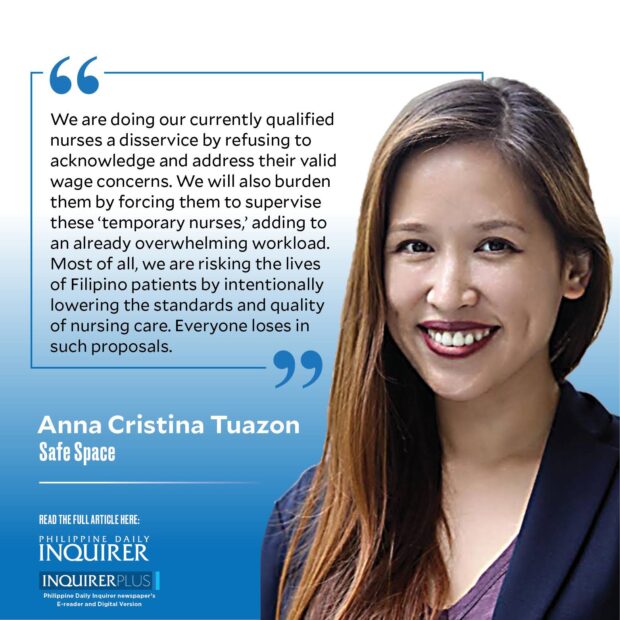Not a nurse shortage, but a wage shortage

Some senators criticized Department of Health (DOH) Secretary Teodoro Herbosa’s proposal last Tuesday to hire those who did not pass the nursing board exam as a temporary measure to address the nurse staffing shortage in the country. This was proposed despite last May’s nursing board exam yielding 10,764 newly licensed nurses or 75 percent of those who took the exam. This is a proposal similar in thought to the Commission on Higher Education’s proposal to create “exit credentials” in the nursing curriculum, allowing nursing students to enter the health workforce after just a year of study.
I simply do not understand the logic behind these proposed solutions. It is actually a misnomer to say that we have a nursing shortage in this country. We have plenty of qualified licensed nurses. DOH estimates that we have more than 915,000 registered nurses in the Philippines. After producing newly licensed nurses last May, another board exam will be held this November. No doubt about it, we are producing a significant mass of nurses.
However, plenty of nurses can’t find stable and financially viable work in local settings. The Department of Labor and Employment has pegged the average entry-level salary of a nurse at only around P8,000-P13,000 a month, a far cry from their foreign counterparts. One-third of our registered nurses have already migrated, choosing not to join the local workforce due to poor working conditions. The group Filipino Nurses United (FNU) stressed that there are almost 125,000 nurses with “no specified field of practice,” meaning that they are either unemployed, underemployed, or have changed careers.
Despite the ideal nurse-patient ratio being 1:12, our nurses have had to put up with a ratio of as high as 1:50. Some are even willing to temporarily put up with the dismal pay but they have not even been regularized, thus receive no benefits, have limited career growth potential, and risk being terminated at any time. FNU said that as of last year, 60 percent of health-care workers have not yet even received COVID-19 benefits and compensation. Is it any wonder then that our nurses are choosing to migrate and take on jobs that offer better economic security for their families?
It is not difficult to understand what is at the root cause of our nursing crisis, which has been going on long before the pandemic. Nurses are not being paid enough for the work that they do. And so the solution is actually simple enough. Pay them well. If we want them to stay and work in our country, we need to pay them so they can feasibly take care of themselves and their families. If we cannot exactly match the salary offers from abroad, we can compensate by vastly improving their work conditions. We can give them scholarship and tax incentives to offset their costs. We can actually treat them as the heroes we tout them to be.
By focusing on solutions that cater to the undertrained or those not passing professional standards, what we are doing is bypassing our world-renowned, qualified licensed nurses and choosing to exploit those who are less qualified and might be desperate enough to take on an unlivable wage. This is exploitation because we will tempt students and board exam takers with even lower wages and derailing them from completing their education and qualifications, their ticket to upward social mobility. We are doing our currently qualified nurses a disservice by refusing to acknowledge and address their valid wage concerns. We will also burden them by forcing them to supervise these “temporary nurses,” adding to an already overwhelming workload. Most of all, we are risking the lives of Filipino patients by intentionally lowering the standards and quality of nursing care. Everyone loses in such proposals.
In a way, it is my cynical side that understands why government proposals are focusing on this direction. The government does not want to pay. They will say that it’s not that they don’t want to, it’s just that they can’t. Though, given the speedy approvals of discretionary funds for other offices and agencies, it will be hard to believe this argument. You cannot claim to have universal health care without being willing to pay for it. It really is just that simple.




















